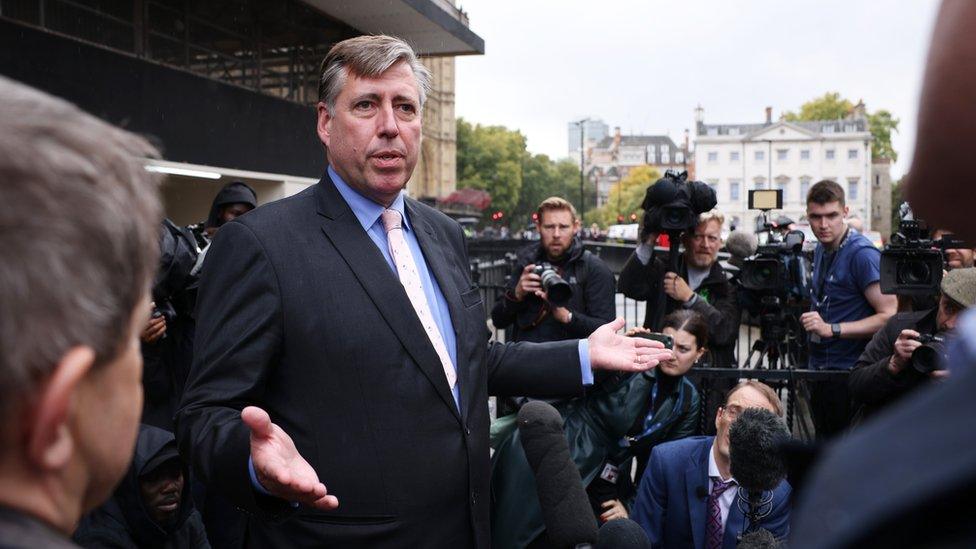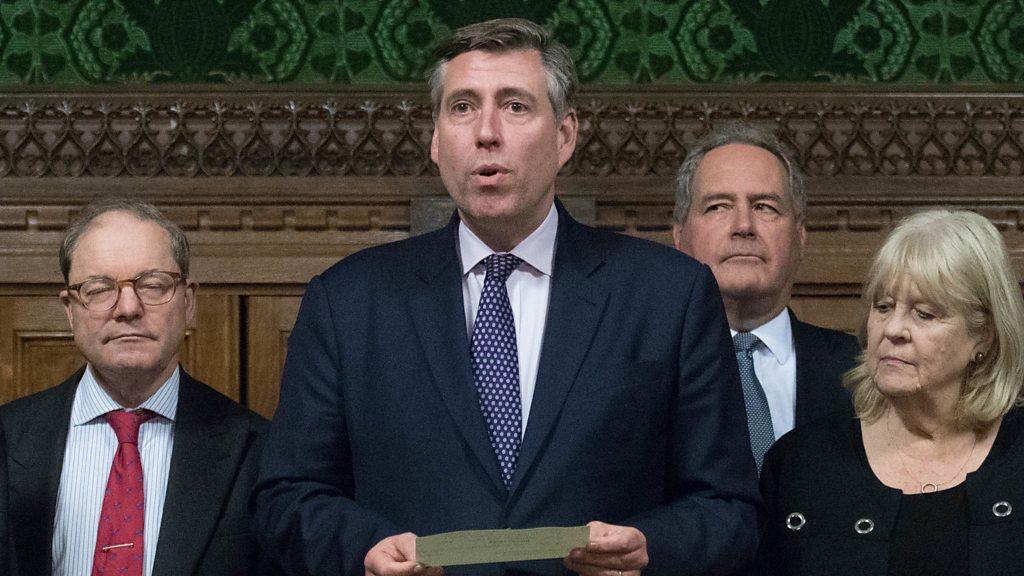Graham Brady: Tory Chair of 1922 committee to stand down as MP
- Published

Sir Graham speaks to the press about plans for a Conservative party leadership election after Liz Truss resigns
Influential backbench Tory MP Sir Graham Brady has announced he will stand down at the next election.
As chair of the 1922 Committee, Sir Graham oversaw the appointment of three prime ministers as Conservative party leaders - and two no confidence votes.
After 26 years as Conservative MP for Altrincham and Sale West, Sir Graham said he wanted to leave while "young enough to pursue other opportunities".
He said representing his hometown had "been an immense privilege".
Born in Salford in 1967, Sir Graham first became active in the Conservative Party aged just 16 when - as a grammar school pupil - he joined a campaign to save local grammar schools.
He studied law at Durham University before taking jobs at the think tank, the Centre for Policy Studies, in public relations and later as public affairs director at a law firm.
In 1997 - shortly before his 30th birthday - he was elected MP for Altrincham and Sale West in Greater Manchester, making him the youngest Conservative MP at the time.
He went on to serve as a party whip - the MPs who are in charge of party discipline - and his star rose as he served as a shadow education minister and parliamentary private secretary to then-Tory leader Michael Howard in 2003.
As staunch supporter of Brexit, Sir Graham served as shadow Europe minister under David Cameron but quit in 2007 after Mr Cameron opposed grammar schools.
In 2010, he was elected chairman of the 1922 Committee, a role he's held unchallenged for the past 12 years - the longest serving chairman in the committee's history.
The group - known in Westminster as the "men in grey suits" - meets weekly and discusses the view of the party's backbench MPs.
Sir Graham Brady: I get asked about no confidence letters in the supermarket
A man used to working behind the scenes, Sir Graham became something of a household name as the Conservative party elected then deposed four leaders in six years.
One role of the chair of the 1922 Committee is to oversee the election of the leader of the Conservative Party.
After his old boss, Mr Cameron stood down in 2016, he oversaw his first contest when Theresa May was appointed leader of the Conservative party, and so PM.
He would go to run a record two Tory party leadership elections in a single year, when Liz Truss was appointed last year, only to be replaced by Rishi Sunak two months later.
Sir Graham was also the one to collect letters of no confidence from disgruntled MPs, keeping the number a closely-guarded secret until the threshold to trigger a vote was reached.
He oversaw the no confidence votes in both Ms May and Boris Johnson as their premierships began to crumble.
The only reason he did not oversee the party's July 2019 leadership election - eventually won by Boris Johnson - was because he had stood down as 1922 chairman to consider a bid to become leader himself.
In the end decided against it and returned to his role two months later.
'Fascinating and fulfilling chapter'
He said he plans to continue to serve as head of the 1922 committee "until the end of the parliament, if they want me to".
Sir Graham - who is married with two grown-up children - was knighted in 2017.
In a statement, Sir Graham said: "Representing my hometown in the House of Commons has been an immense privilege for which I will always be grateful.
"I have decided to bring this fascinating and fulfilling chapter of my life to a close while I am young enough to pursue other opportunities and interests, so I will not be standing at the next election."
Related topics
- Published20 October 2022

- Published23 February 2022
